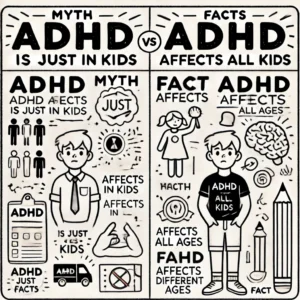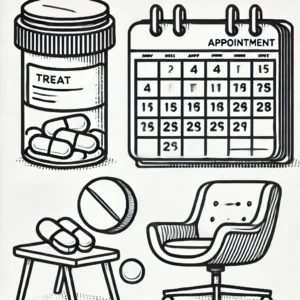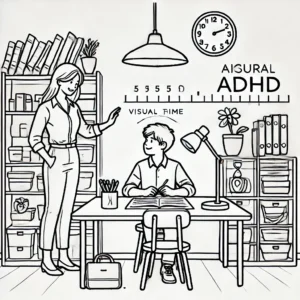Understanding ADHD Treatment Options
ADHD, or Attention Deficit Hyperactivity Disorder, is a complex condition that varies significantly between individuals. Effective management often requires a combination of approaches tailored to an individual’s unique challenges and strengths. In the UK, the NHS provides a structured framework for ADHD treatment, focusing on medication, therapy, and lifestyle adjustments. Here’s an in-depth look at these options and how they work together to improve quality of life.
Medication for ADHD
How It Works:
Medications for ADHD, especially stimulant medications like methylphenidate (Ritalin) and lisdexamfetamine (Elvanse), are often the first line of treatment. These drugs work by increasing dopamine and norepinephrine levels in the brain, improving focus, impulse control, and attention.
Non-stimulant options, such as atomoxetine, may also be prescribed for individuals who don’t respond well to stimulants or have contraindications for their use. The choice of medication depends on factors such as age, co-existing conditions, and individual response to treatment.
What to Expect:
Medications are not a cure but a tool to manage symptoms. Patients often work closely with healthcare providers to find the right type and dosage, a process that may require adjustments over time. Regular follow-ups ensure that medications remain effective and side effects are minimized.
Cognitive Behavioral Therapy (CBT)
Addressing Behavioral Challenges:
CBT is a structured form of psychotherapy that focuses on identifying and changing negative thought patterns and behaviors. For individuals with ADHD, CBT can address issues such as procrastination, disorganization, and low self-esteem.
How It Helps:
- Teaches practical skills to manage distractions and improve organization.
- Provides tools to regulate emotions and reduce impulsivity.
- Builds strategies for coping with stress and improving relationships.
CBT is often used alongside medication to provide comprehensive support for ADHD symptoms.
Lifestyle Adjustments
Building Supportive Habits:
Lifestyle changes are a cornerstone of ADHD management, helping individuals create environments that minimize distractions and maximize productivity.
Key Strategies Include:
- Routine and Structure: Establishing consistent daily routines to reduce overwhelm.
- Physical Activity: Regular exercise boosts mood and focus by increasing dopamine levels naturally.
- Diet and Nutrition: A balanced diet rich in protein, whole grains, and omega-3 fatty acids can support brain health.
- Sleep Hygiene: Prioritizing restful sleep to improve focus and emotional regulation.
Support systems, such as ADHD coaching or joining local support groups, can further enhance the effectiveness of lifestyle changes.
Collaborating with Healthcare Providers
Why It Matters:
Effective ADHD management is a partnership between the individual, their family, and healthcare professionals. Collaborative treatment planning ensures that all aspects of the condition—medical, psychological, and practical—are addressed.
The NHS provides a range of services for ADHD diagnosis and treatment, including access to psychiatrists, psychologists, and specialist nurses. General practitioners (GPs) can also offer guidance and referrals to specialist services.
Accessing ADHD Treatments in the UK
The NHS outlines the following steps for accessing ADHD treatment:
- Diagnosis: A formal assessment by a qualified healthcare professional is required.
- Treatment Plan: Based on the diagnosis, a combination of medication, therapy, and lifestyle changes is recommended.
- Follow-Up Care: Regular check-ins ensure that the treatment plan remains effective and is adjusted as needed.
The NHS ADHD Guide provides detailed information on treatment pathways available in the UK, making it an invaluable resource for individuals seeking support.
Conclusion
ADHD treatment is most effective when it’s personalized, integrating medication, therapy, and lifestyle changes. By collaborating with healthcare providers and leveraging resources like the NHS, individuals with ADHD can build strategies to manage their symptoms and thrive in daily life. Whether through medication that enhances focus or CBT that builds coping skills, the journey to managing ADHD is unique for everyone but always benefits from informed, comprehensive care.









